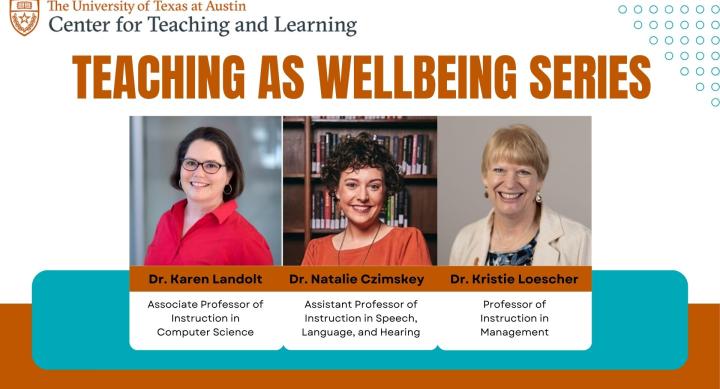
Inspiring Educators: UT System’s “Teaching as Wellbeing” Series
Over the course of the 2023-24 academic year, the “Teaching as Wellbeing” virtual mini-conference series, sponsored by the UT System Academy of Distinguished Teachers (UTSADT) in collaboration with UT System Faculty Developers, has served as a monthly thinktank about the relationship between teaching, learning, and wellbeing for educators and educational developers across UT system.
On April 11, 2024, the final installation of the series, facilitated by Center for Teaching and Learning director Molly Hatcher, featured three esteemed educators who are members of UT Austin’s Provost’s Teaching Fellows (PTF) Program. This faculty-led teaching innovation program, which features grant funding and a robust mentorship program, has shaped UT Austin through its vision of a campus that embraces creativity, innovation, and a passion for teaching and learning that is complementary to its mission of advancing knowledge through research. Dr. Stephanie Holmsten, past chair for the PTF program, shared insights about the opportunities provided by the program, especially the wealth of time the four-year grant structure affords fellows to deeply engage with their projects in order to make a meaningful impact.
The Presenters
The event featured a lineup of dedicated faculty members whose projects are improving student success and well-being on campus:
Dr. Karen Landolt, Associate Professor of Instruction in Computer Science, though not present, contributed a resource on “teaching as wellness” activities. Her “name that tune” exercise and peer-assisted learning groups for briefing complex legal cases illustrated innovative methods to enhance student understanding and support.
Dr. Natalie Czimskey, Assistant Professor of Instruction in Speech, Language, and Hearing Sciences, shared her “Compassion Project.” Her initiative aims to increase students’ perception of compassion from professors. Through a comprehensive survey, Dr. Czimskey uncovered that students felt most cared for when instructors demonstrated care through actions such as calling them by name, sharing personal anecdotes, and addressing occurrences that could impact their emotional wellbeing. She presented specific pedagogical strategies she integrated into her pedagogy that emerged from these insights, such as allowing flexibility in test-taking and asking students to weigh in on assignment due dates to foster a more compassionate learning environment.
Dr. Kristie Loescher, Professor of Instruction in Management, delved into her project on elevating classroom excellence. She addressed the perceived tension between student’s requests for flexibility/accommodation and faculty rigor expectations. Dr. Loescher’s departmental committee’s efforts to define rigor and create instructor resources such as syllabi statements a “rigor rubric”, and midsemester feedback questions are a testament to her ongoing commitment to academic excellence.
The stories shared by session presenters were a testament to the power of faculty-led initiatives in enhancing student well-being on campus and creating a nurturing educational environment.
Takeaways and Future Applications
The session concluded with a reflective segment, allowing participants to identify key takeaways and consider how they could integrate the lessons learned into their own higher education contexts. This moment of introspection was a call to action for all educators to consider the well-being of their students as integral to the teaching process

